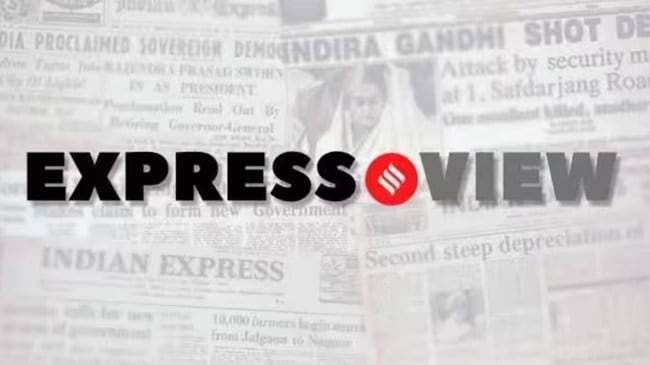Opinion Express View: New Bills on ministers with criminal charges are bad faith, bad law
To argue that ‘the people’ will decide if their ministers should run the government from jail subverts people’s rights. The Bills deserve to travel no further
 The Bills, which have gone to a joint parliamentary panel, deserve to travel no further. They should be rejected.
The Bills, which have gone to a joint parliamentary panel, deserve to travel no further. They should be rejected. On the face of it, the Constitution (130th Amendment) Bill and two related Bills, tabled in the Lok Sabha and sent to a joint committee on Wednesday, frame a concern about political corruption and seek to enforce constitutional morality. In fact, however, the Bills are deeply troubling pieces of legislation that arrogate to the Executive expanded and concentrated state power and severely shrink safeguards, checks and balances. They undermine the principle of separation of powers and violate federal autonomy. According to the Bills, if any minister, including chief ministers and the Prime Minister, is arrested and remains in custody for 30 straight days, for an offence punishable by five years or more in jail, he or she must resign or lose their office. This proposed automatic removal on unproven charges marks an inexplicable and disturbing departure from the established principle of disqualification only after conviction — in its ruling in the Lily Thomas case in 2013, the Supreme Court held that a conviction which carries a sentence of two years or more would result in the disqualification of a legislator from holding public office and contesting elections from the date of conviction. In a climate in which the executive has shown little compunction in weaponising central agencies to target political opponents, and when the guard rails of the federal framework are under strain, the Bills only add to the dubious arsenal of the Centre’s ruling party.
In the past, chief ministers have resigned before being sent to jail in cases of corruption, from Lalu Prasad in Bihar in the 1990s to Hemant Soren in Jharkhand more recently — Arvind Kejriwal, who continued as Delhi Chief Minister even after being taken into custody in the Delhi excise policy case, was an exception. But that is a call that must remain a political one. It is a matter between the political party and the politician, and then between the politician and the people. Of course, the judicial process is infamously prone to delays, but short-circuiting the due process of law, overturning the principle of innocent till proved guilty, and handing untrammelled power to the ruling establishment at the Centre is certainly not the answer. All Union governments have misused central agencies against political opponents — the CBI was dubbed the “Congress Bureau of Investigation” and a “caged parrot” in the tenure of the UPA. But the last 10 years or so have seen this distortion acquire a new scale. Since 2014, there has been a starkly disproportionate targeting by the CBI and ED of Opposition leaders, who win an instant reprieve when they cross over to the BJP. The ED, which has acquired a reputation for being the prime instrument of this vindictive politics, armed with stringent laws that make bail more difficult, has a pathetic conviction rate. It has, time and again, been rebuked by the SC, as for its money laundering investigation in the Tamil Nadu State Marketing Corporation case.
To argue, as the Home Minister does, that “the people” will decide if their ministers should run the government from jail, is a cynical framing that subverts people’s rights in their own name. The Bills, which have gone to a joint parliamentary panel, deserve to travel no further. They should be rejected.






